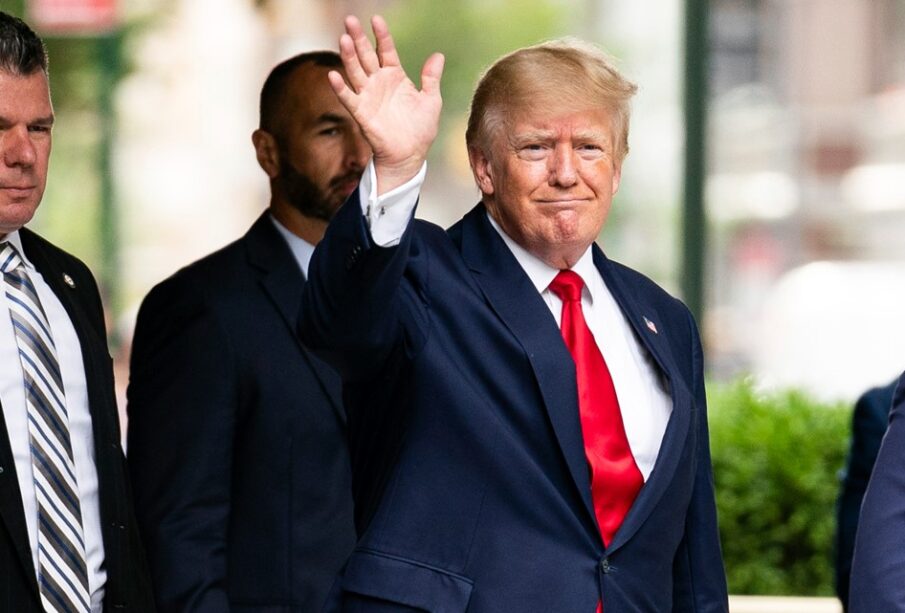FBI seized top secret documents at Trump’s home, U.S. government says
 Former US President Donald Trump raises his fist while walking to a vehicle outside of Trump Tower in New York City on Aug.10, 2022.
Photographer: Stringer/AFP via Getty Images
Former US President Donald Trump raises his fist while walking to a vehicle outside of Trump Tower in New York City on Aug.10, 2022.
Photographer: Stringer/AFP via Getty ImagesFBI agents who searched former President Donald Trump’s Florida home this week removed 11 sets of classified documents including some marked as top secret, the U.S. Justice Department said on Friday while also disclosing that prosecutors had probable cause to believe Trump may have violated the Espionage Act.
The bombshell disclosures were made in a search warrant and accompanying legal documents released four days after FBI agents carried out the search of Trump’s Mar-a-Lago residence in Palm Beach based on a warrant approved by a federal magistrate judge.
Trump, in a statement on his social media platform, said the records at issue were “all declassified” and placed in “secure storage.”
“They didn’t need to ‘seize’ anything. They could have had it anytime they wanted without playing politics and breaking into Mar-a-Lago,” the Republican businessman-turned-politician said.
The Justice Department said in the warrant application approved by U.S. Magistrate Judge Bruce Reinhart that it had probable cause to believe that Trump may have violated the Espionage Act, a federal law that prohibits the possession or transmission of national defense information.
The department also said it had concerns he may have broken several other statutes related to the mishandling of government records including one that makes it a crime to try to hide or destroy government documents regardless of whether they are classified.
FBI agents took more than 30 items including more than 20 boxes, binders of photos, a handwritten note and the executive grant of clemency for Trump’s ally and longtime adviser Roger Stone, a list of items removed from the property showed. Also included in the list was information about the “President of France.”
The warrant showed that FBI agents asked to search a room called “the 45 Office” – Trump was the 45th U.S. president – as well as all other rooms, structures of buildings on the estate used by Trump or his staff where boxes or documents could be stored.
There are three primary levels of classification for sensitive government materials: Top secret, secret, and confidential.
“Top secret” is the highest level of classification, reserved for the country’s most closely held national security information. Such documents usually are kept in special government facilities because disclosure could cause grave damage to national security.
FBI agents on Monday collected four sets of top secret documents, three sets of secret documents and three sets of confidential documents, the documents showed. They also showed that agents collected a set of documents labeled “classified/TS/SCI documents” – a reference to top secret and sensitive compartmented material.
While a sitting president has authority to declassify materials, there was no indication in any of the documents released on Friday that Trump had done so prior to leaving office in January 2021.
Aug 12 (Reuters) – FBI agents who searched former President Donald Trump’s Florida home this week removed 11 sets of classified documents including some marked as top secret, the U.S. Justice Department said on Friday while also disclosing that prosecutors had probable cause to believe Trump may have violated the Espionage Act.
The bombshell disclosures were made in a search warrant and accompanying legal documents released four days after FBI agents carried out the search of Trump’s Mar-a-Lago residence in Palm Beach based on a warrant approved by a federal magistrate judge.
Trump, in a statement on his social media platform, said the records at issue were “all declassified” and placed in “secure storage.”
“They didn’t need to ‘seize’ anything. They could have had it anytime they wanted without playing politics and breaking into Mar-a-Lago,” the Republican businessman-turned-politician said.
The Justice Department said in the warrant application approved by U.S. Magistrate Judge Bruce Reinhart that it had probable cause to believe that Trump may have violated the Espionage Act, a federal law that prohibits the possession or transmission of national defense information.
The department also said it had concerns he may have broken several other statutes related to the mishandling of government records including one that makes it a crime to try to hide or destroy government documents regardless of whether they are classified.
FBI agents took more than 30 items including more than 20 boxes, binders of photos, a handwritten note and the executive grant of clemency for Trump’s ally and longtime adviser Roger Stone, a list of items removed from the property showed. Also included in the list was information about the “President of France.”
The warrant showed that FBI agents asked to search a room called “the 45 Office” – Trump was the 45th U.S. president – as well as all other rooms, structures of buildings on the estate used by Trump or his staff where boxes or documents could be stored.
There are three primary levels of classification for sensitive government materials: Top secret, secret, and confidential.
“Top secret” is the highest level of classification, reserved for the country’s most closely held national security information. Such documents usually are kept in special government facilities because disclosure could cause grave damage to national security.
FBI agents on Monday collected four sets of top secret documents, three sets of secret documents and three sets of confidential documents, the documents showed. They also showed that agents collected a set of documents labeled “classified/TS/SCI documents” – a reference to top secret and sensitive compartmented material.
While a sitting president has authority to declassify materials, there was no indication in any of the documents released on Friday that Trump had done so prior to leaving office in January 2021.
AN ESCALATION
Monday’s search of Trump’s home marked a significant escalation in one of the many federal and state investigations he is facing from his time in office and in private business, including a separate one by the Justice Department into a failed bid by Trump’s allies to overturn the 2020 presidential election by submitting phony slates of electors.
Attorney General Merrick Garland on Thursday announced that the department asked Reinhart to unseal the warrant. This followed Trump’s claim that the search was political retribution and a suggestion by him, without evidence, that the FBI may have planted evidence against him.
The investigation into Trump’s removal of records started this year, after the National Archives and Records Administration, an agency charged with safeguarding presidential records that belong to the public, made a referral to the department.
On Friday, Republican members of the U.S. House of Representatives Intelligence Committee called on Garland and FBI Director Chris Wray to release the affidavit underpinning the warrant, saying the public needs to know.
“Because many other options were available to them, we’re very concerned of the method that was used in raiding Mar-a-Lago,” Representative Michael Turner, the committee’s top Republican, told reporters.
If the affidavit remains sealed, “it will still leave many unanswered questions,” Turner added.
In February, Archivist of the United States David Ferriero told House lawmakers that his agency had been in communication with Trump throughout 2021 about the return of 15 boxes of records. He eventually returned them in January 2022.
At the time, the National Archives was still conducting an inventory, but noted some of the boxes contained items “marked as classified national security information.” Trump previously confirmed that he had agreed to return certain records to the Archives, calling it “an ordinary and routine process.” He also claimed the Archives “did not ‘find’ anything.”
Since Monday’s search, the Justice Department has faced fierce criticism and online threats, which Garland have condemned. Trump supporters and some of his fellow Republicans in Washington have accused Democrats of weaponizing the federal bureaucracy to target him even as he mulls another run for the presidency in 2024.
In another matter, Trump on Wednesday declined to answer questions during an appearance before New York state’s attorney general in a civil investigation into his family’s business practices, citing his constitutional right against self-incrimination.
Earlier on Friday, Trump denied a Washington Post report that the FBI search of his home was for possible classified materials related to nuclear weapons, writing on his social media account that the “nuclear weapons issue is a hoax.”
Reuters could not immediately confirm the Washington Post report. Garland has declined to publicly detail the nature of the investigation.
SOURCE: REUTERS










